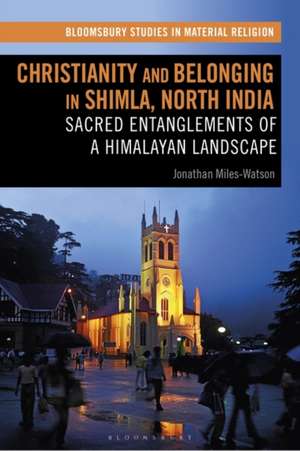Christianity and Belonging in Shimla, North India: Sacred Entanglements of a Himalayan Landscape: Bloomsbury Studies in Material Religion
Autor Jonathan Miles-Watsonen Limba Engleză Paperback – 20 apr 2022
| Toate formatele și edițiile | Preț | Express |
|---|---|---|
| Paperback (1) | 196.54 lei 6-8 săpt. | |
| Bloomsbury Publishing – 20 apr 2022 | 196.54 lei 6-8 săpt. | |
| Hardback (1) | 597.12 lei 6-8 săpt. | |
| Bloomsbury Publishing – 30 sep 2020 | 597.12 lei 6-8 săpt. |
Preț: 196.54 lei
Preț vechi: 257.21 lei
-24% Nou
Puncte Express: 295
Preț estimativ în valută:
37.61€ • 39.37$ • 31.12£
37.61€ • 39.37$ • 31.12£
Carte tipărită la comandă
Livrare economică 05-19 aprilie
Preluare comenzi: 021 569.72.76
Specificații
ISBN-13: 9781350185296
ISBN-10: 1350185299
Pagini: 224
Ilustrații: 10 bw illus
Dimensiuni: 156 x 234 mm
Greutate: 0.28 kg
Editura: Bloomsbury Publishing
Colecția Bloomsbury Academic
Seria Bloomsbury Studies in Material Religion
Locul publicării:London, United Kingdom
ISBN-10: 1350185299
Pagini: 224
Ilustrații: 10 bw illus
Dimensiuni: 156 x 234 mm
Greutate: 0.28 kg
Editura: Bloomsbury Publishing
Colecția Bloomsbury Academic
Seria Bloomsbury Studies in Material Religion
Locul publicării:London, United Kingdom
Caracteristici
Draws on recent developments in both material religion and the anthropology of Christianity to provide a new theory of sacred landscape
Notă biografică
Jonathan Miles-Watson is Associate Professor of the Anthropology of Religion at Durham University, UK. He has carried out extensive fieldwork in both North India and the UK. He is co-editor of The Bloomsbury Reader in the Study of Myth (Bloomsbury, 2019).
Cuprins
Preface1. Sita's Red Dress: Introduction2. Christ in the Land of Gods: Context3. Worshiping with Ghosts: The Cathedral on the Ridge4. Materiality, Heterodoxy and Skill: The Hidden Cathedral 5. Pipe Organs and Satsang: Inculturation, Enskilment and Conflict6. Entanglements at Jakhoo: Materiality Beyond Pluralism7. Cyberspace and the Formation of Shimla's Sacred Places8. The Salt in the Stew: ConclusionNotesReferencesIndex
Recenzii
A wonderfully engaging, restless book. As he reflects on Christianity, landscape and belonging in postcolonial Shimla, Jonathan Miles-Watson constantly provokes the reader into reassessing what they think they know about the Himalayas, Christianity and anthropology. This is an important contribution to the study of material religion.
'A beautifully written, original, compelling ethnography that promises to advance multiple subfields, some perhaps significantly.'
In lilting prose, and through the lens of a minority religion, Jonathan Miles-Watson argues that the Himalayan landscape mediates between the region's past and present. Part ethnographic story about the modern residents of a Himalayan town and part colonial history about a famous hill station, Christianity and Belonging in Shimla, North India argues that material religion is best understood through the vital relationships inherent in everyday life.
'A beautifully written, original, compelling ethnography that promises to advance multiple subfields, some perhaps significantly.'
In lilting prose, and through the lens of a minority religion, Jonathan Miles-Watson argues that the Himalayan landscape mediates between the region's past and present. Part ethnographic story about the modern residents of a Himalayan town and part colonial history about a famous hill station, Christianity and Belonging in Shimla, North India argues that material religion is best understood through the vital relationships inherent in everyday life.














